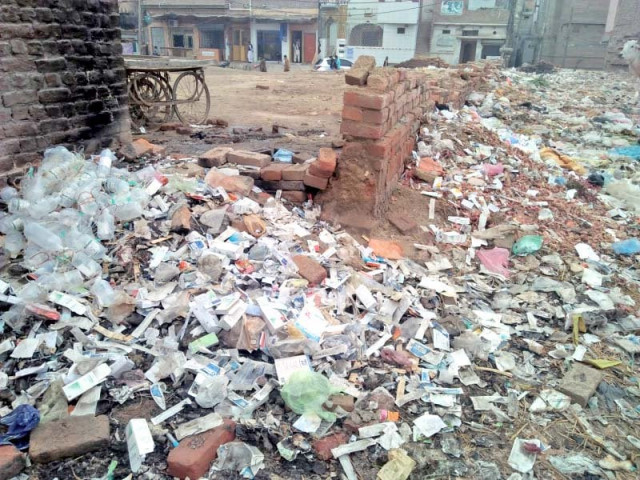Medical waste fouls city’s streets, beaches, nullahs
Despite claims hospitals are abiding by govt directives, officials fail to provide records of lawful waste disposal

Despite claims hospitals are abiding by govt directives, officials fail to provide records of lawful waste disposal. PHOTO: EXPRESS
On Friday, officials of the Sindh Environment Protection Agency (SEPA) found over 40 kilogrammes of medical waste dumped in an open nullah, near Khamiso Goth, along Super Highway.
The medical waste disposed at three different locations within a radius of 400 metres was burnt by unidentified persons. “I can’t say who has disposed of the waste in the nullah,” said SEPA Deputy Director Waris Ali Gabol. “A proper investigation will be initiated,” he pledged.
The environment department’s officials claim that they had been directing hospital managements to share their hospital waste management plans. But despite tall claims, the harmful waste is being dumped in different localities of Karachi.
Medical waste littered outside Dow Dental College in Karachi
On December 16, medical waste was found at the one the famous beaches of the city - the Hawkes Bay Beach. “I have seen used syringes and other stuff at different spots,” said a government official, speaking on condition of anonymity. He told The Express Tribune that he had often collected needles and removed them from spots outside the spots where citizens often stroll barefoot.
“You’ll see everything on the beach and who cares if it could hurt the visitors,” he commented, saying that many visitors had been injured by needles and other objects.
Earlier, The Express Tribune had reported of medical waste spilling out of trash bins placed outside Dow Dental College and metropolis’ streets, in different areas, often found strewn with the hazardous detritus.
An estimated 100 tonnes of medical waste is produced by hospitals in Karachi, accommodating 10 or more beds, on a daily basis. According to health department officials, there are over 225 such hospitals in the metropolis.
In September last year, the environment department’s officials had written letters to various hospitals and different stakeholders, seeking details if their waste management plans. The initiative was taken after Shaniera Akram, wife of former cricketer Wasim Akram, posted several photos and a video of hospital waste dumped at various points along the Clifton Beach on social media.
According to Environment, Climate Change and Coastal Development Secretary Khan Muhammad Mahar, letters are written to hospitals daily. He claims that hospitals are duly carrying out the department’s instructions. However, contrary to Mahar’s claim, one of the officials from the department, who asked not to be named, told The Express Tribune no improvement is seen. “There is no mechanism to keep a proper check on the hospitals,” he said, adding “We can only ask private hospitals to abide by the laws but cannot strictly bound government hospitals to obey the orders.”
When asked for the record of hospitals abiding by the department’s orders, Mahar refused to provide the data, stating “it is not possible for him.” He was also unable to provide an answer when asked to specify which hospitals, whether public or private, have been abiding by the department’s directives.
Of all the public hospitals in Sindh, only five teaching hospitals have standard operating procedures to dispose of waste using scientific methods, including sterilisation and incineration. These hospitals include the Jinnah Postgraduate and Medical Centre, Dr Ruth Pfau Civil Hospital and Lyari Hospital in Karachi, and Liaquat Hospital and Benazir Bhutto University Hospital in Larkana.
Speaking on the matter, a SEPA official claimed, “Private hospitals have a proper mechanism of incineration.” However, he added, ”Honestly, we have started asking hospitals to share their waste management plans recently,”, saying that it would take time for the hospitals to fully implement the orders.
Public hospitals have no idea on how to dispose of their waste
Talking to The Express Tribune, a SEPA official revealed that despite multiple drives against the unauthorised dumping of medical waste, the agency’s teams have found medical waste dumped at a number of locations in the city, including the Korangi River. “Sometimes medical waste is dumped by the contractors in an attempt to save fuel,” he said. “But we cannot say if hospitals are not responsible for the offence because it is their responsibility to monitor where the waste is being dumped and via what process,” he added.
In 2005, the Sindh government crafted rules regarding the scientific disposal of medical waste, while in 2012, the rules were amended under the Environmental Protection Act of 1997. According to the rules, medical waste must be dumped in secure places according to scientific techniques. The irony is that most medical facilities don’t even know that such a law exists, let alone take steps towards its implementation.
Repeated attempts were made to contact Adviser to Sindh Chief Minister on Environment, Coastal Development and Climate Change Barrister Murtaza Wahab, however, he remained unavailable for comment.
Published in The Express Tribune, January 4th, 2020.


















COMMENTS
Comments are moderated and generally will be posted if they are on-topic and not abusive.
For more information, please see our Comments FAQ